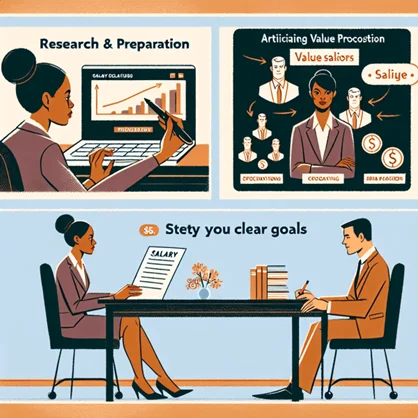Blog
Mastering the Salary Conversation: Essential Strategies for Effective Negotiation
1. Research and Prepare for Success
Understanding average salaries for your role is essential when entering salary negotiations. Consider factors like your experience level and geographic location, as these can significantly influence pay expectations. Gather data on company-specific compensation packages to know what you can realistically aim for.
Tools and Resources for Salary Research:
- Salary Surveys: Obtain up-to-date industry standards by participating in or reviewing salary surveys.
- Glassdoor: Use this platform to explore employee-reported salaries and company reviews.
- Industry Reports: Leverage reports from professional organizations related to your field for detailed insights.
Effective preparation lays the foundation for successful salary discussions.
2. Articulate Your Value Proposition
Conveying your unique contributions to an organization is crucial in salary negotiations. Start by creating a detailed list of your key skills and past achievements that highlight your potential for adding value. Consider how these align with the company’s objectives:
- Identify core competencies that set you apart from others in your field.
- Highlight specific accomplishments, such as successful projects or leadership roles, that demonstrate your impact.
- Link your capabilities directly to the company’s goals to reinforce why you are indispensable.
Aligning your value with the company’s strategic vision enhances negotiation leverage, demonstrating both personal worth and organizational alignment.
3. Set Clear Goals for Negotiation
To effectively navigate salary discussions, setting clear goals is crucial. Start by defining your baseline, also known as the minimum acceptable salary. This figure represents the least amount you are willing to accept based on your financial needs and market value.
Next, establish a stretch goal—the ideal salary you aim to achieve. This benchmark serves as a target during negotiations and provides room for compromise.
Managing expectations is vital throughout this process. By having a well-defined negotiation framework, you ensure your objectives align with realistic outcomes, enhancing your confidence in mastering the salary conversation.
4. Practice Your Pitch with Confidence
Rehearsal is crucial for honing your communication skills and boosting your confidence in negotiation scenarios. By practicing your talking points, you ensure clarity and precision when presenting your case. Consider potential questions employers might ask, and prepare insightful responses to demonstrate readiness.
Confident communication during negotiations can be achieved through techniques such as:
- Maintaining eye contact
- Using positive body language
- Speaking clearly and directly
These methods not only convey assurance but also enhance the overall impact of your pitch, setting the stage for a successful salary conversation.
5. Timing Matters: When to Discuss Salary?

Strategic timing is crucial in salary negotiations. Recognizing the right moments, such as post-job offer or during performance reviews, can significantly impact your success. Initiating salary conversations within the appropriate context helps convey your understanding of professional norms and increases the likelihood of a positive outcome.
Key Moments for Salary Discussions
- Post-Job Offer: After receiving a job offer, the employer has already shown interest, providing a strong position for negotiations.
- Performance Reviews: These are natural opportunities to discuss compensation adjustments based on demonstrated achievements and contributions.
Stay Alert for Signs
Watch for signs like company-wide raises or budget planning periods, indicating it’s an opportune time to discuss compensation.
6. Explore Non-Monetary Compensation Options
When navigating the complexities of benefits negotiation, it’s essential to look beyond the base salary. Consider alternative compensation avenues, such as:
- Health Benefits and Flexible Work Arrangements: Opt for remote work opportunities or comprehensive health packages to enhance job satisfaction.
- Bonuses and Stock Options: Negotiating for bonuses or equity can significantly increase your financial rewards, providing an incentive-based compensation structure.
- Professional Development Opportunities: Access to training programs or educational reimbursements not only boosts your skill set but also enriches your overall compensation package.
Mastering these aspects of the salary conversation empowers you to craft a holistic compensation plan that aligns with your career goals.
7. Adopt a Collaborative Negotiation Style
Understanding different negotiation styles can significantly impact the outcome of your salary discussions. A collaborative approach focuses on achieving mutual gain, fostering a positive relationship between you and the employer. This style contrasts with competitive tactics, which may alienate the other party and hinder long-term collaboration.
Benefits of Collaborative Strategies Over Competitive Tactics:
- Builds trust and rapport
- Encourages openness and transparency
- Leads to win-win outcomes
Techniques for Assertive Yet Respectful Negotiation:
- Clearly state your needs while listening actively
- Use “I” statements to express your interests
- Stay calm and professional, even when faced with challenges
A collaborative negotiation style not only facilitates better salary outcomes but also contributes to a favorable work environment.
8. Use Competing Offers to Your Advantage
Using competing job offers strategically can greatly improve your negotiation power. Here’s how:
Use Other Job Offers as Leverage
Presenting another offer can show how in-demand you are in the job market, making you appear more valuable to the employer.
Demonstrate Market Value
Having multiple job offers reinforces your skills and worth, giving you a concrete reference point for negotiations.
Ethical Considerations
While using other offers to negotiate, it’s important to be honest and transparent. Misrepresenting offers could harm trust and future relationships.
This method not only strengthens your position but also ensures you are fairly compensated for your abilities.
9. Avoid Undercutting Yourself in Salary Discussions
Negotiating your salary is a crucial part of advancing your career. Stating a low desired salary can have a significant negative effect on your long-term earning potential. To avoid this mistake, here are some strategies you can use:
- Research Thoroughly: Understand industry standards to set realistic yet ambitious salary expectations.
- Communicate Confidence: Clearly articulate your value and skills that justify a higher salary.
- Balance Honesty with Ambition: Be transparent about your needs but aim high, aligning your ask with both market value and your unique contributions.
Mastering the salary conversation means showing that you are a valuable asset without limiting how much money you can make.
10. Follow-Up Professionally After Negotiations
Expressing gratitude in negotiations plays a crucial role in maintaining a positive atmosphere. A simple thank you can go a long way, regardless of the negotiation outcome.
It’s essential to request a decision-making time frame if you need space to consider the offers or negotiate further. This shows thoughtfulness and professionalism. Maintaining ongoing relationships with potential employers is important for future opportunities. Even if you decide not to accept an offer, leaving the door open for future interactions can be beneficial for your career trajectory.
Conclusion: Empower Your Career Through Effective Salary Negotiation Strategies!
Mastering the art of salary negotiation opens doors to career growth and financial empowerment. Embrace these proven strategies to elevate your professional journey and achieve the compensation you deserve.
By consistently honing these skills, you can turn salary conversations into powerful tools for career advancement. To learn more about our services and how we can support your career goals, visit our Interview Preparation Services page. Let us help you navigate salary negotiations and much more to unlock your full potential!
Latest Posts
- How to Write Engaging LinkedIn Articles That Build Your Brand
- How to Perfectly Align Your LinkedIn Profile with Your Resume
- How to Update Your Resume for 2025: Expert Tips from NimoHR
- Expert Resume Formatting Tips to Beat Applicant Tracking Systems (ATS)
- Industry-Specific CV Writing: Why One-Size-Fits-All Doesn’t Work
- How a Professionally Written CV Can Speed Up Your Job Search
- Why LinkedIn Profile Optimization is the Secret to Standing Out in a Competitive Job Market
- How a LinkedIn Profile Writer Can Transform Your Online Presence
- Enhancing Your Job Application: The Value of a Cover Letter Review Service
- Common Mistakes in Cover Letters and How Professional Services Can Help
- Overcoming Common Interview Challenges: Gaps in Employment and Career Transitions
- The Role of Non-Verbal Communication in Job Interviews
- Choosing Between Quitting and Getting Fired: What’s Best for Your Career?
- Mastering LinkedIn Skills: How to Choose the Best Skills for Career Growth
- 5 Proven Strategies to Send LinkedIn Invitations That Get Accepted
- Crafting the Perfect Cover Letter for an Internal Position: A Step-by-Step Guide
- Did You Know? Your Resume Reference Page Could Make or Break Your Job Application
- Crafting a Layoff Notice: Effective Communication During Work Shortages
- Mastering Behavioral Interview Questions: Tips and Examples
- In-Demand Skills for 2024: What to Include on Your Resume
- Navigating Career Transitions: Reshaping Your Resume for a New Path
- How to Optimize Your LinkedIn Profile
- Cracking the Job Interview: Insights from NimoHR’s Interview Preparation Sessions
- Using LinkedIn Articles to Showcase Your Expertise
- Creating a Standout Resume for Phoenix Employers: Tips on crafting a resume tailored to the preferences of local Phoenix employers
- Resume Trends for 2024: What You Need to Know
- From First Impression to Final Question: Excelling at the Four Key Interview Evaluation Points
- Behind the Screens: Understanding the Role of ATS in the Hiring Process
- How to Create the Perfect Executive LinkedIn Profile?
- How to Write a Cover Letter That Gets You the Job You Want
- How To Build A Resume
- Get Professionally Written Resumes And LinkedIn Profiles
- Top 5 Reasons To Avail Of LinkedIn Resume Writing Services
- Helpful Tips For Writing A Perfect Cover Letter
- How to Ace Your Next Interview
- 15 Things To Leave Off Your Resume
- Applying Strategically and Networking
- Effective Interview Strategies
- The Best Job-Board Sites
- 4 Simple Signs That You Should Quit Your Job
- The most common interview questions & the best way to answer them
- How to beat those pesky Applicant Tracking Systems
- Jump-start your career during the COVID-19 crisis
- Questions to ask in an interview
- Career consulting ROI. Why you should purchase a professional resume writing services
- The Importance of a Company Culture and HR’s Role
- Why companies should offer outplacement services and career coaching
- Interview Tips: Back to the Basics
Categories
Related Posts

How to Write Engaging LinkedIn Articles That Build Your Brand
LinkedIn is more than a networking platform—it’s a place to share insights, build authority, and grow your personal brand. Knowing how to write engaging LinkedIn articles can amplify your voice, attract job opportunities, and establish you as an industry thought leader. Whether you’re working with a LinkedIn profile optimization service or looking to boost your… Continue reading How to Write Engaging LinkedIn Articles That Build Your Brand
Read More
How to Perfectly Align Your LinkedIn Profile with Your Resume
Why Alignment Matters Your LinkedIn profile and resume should tell the same story—but tailored for different audiences. While your resume is targeted toward specific job applications, your LinkedIn profile is a living, breathing summary of your career. In today’s job market, hiring managers often look at both. A mismatch can raise red flags. That’s… Continue reading How to Perfectly Align Your LinkedIn Profile with Your Resume
Read More
How to Update Your Resume for 2025: Expert Tips from NimoHR
Updating your resume for 2025 requires more than just listing your latest job. With applicant tracking systems (ATS) becoming more sophisticated, you need to format and write your resume strategically to stand out. At NimoHR, we specialize in helping professionals craft impactful resumes that pass ATS filters and impress hiring managers. If you’re ready to… Continue reading How to Update Your Resume for 2025: Expert Tips from NimoHR
Read More